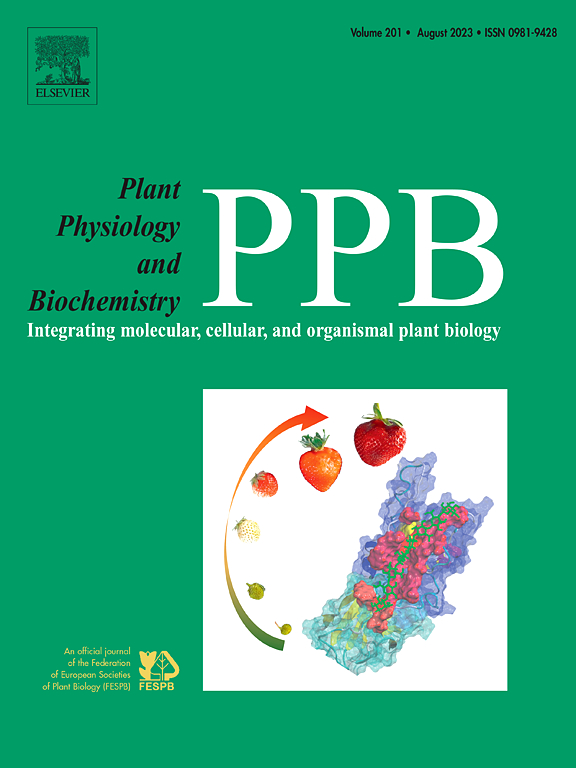Characterization of ATP-dependent phosphofructokinase genes during ripening and their modulation by phytohormones during postharvest storage of citrus fruits (Citrus reticulata Blanco.)
IF 6.1
2区 生物学
Q1 PLANT SCIENCES
引用次数: 0
Abstract
The level of sweetness in citrus fruit is crucial for consumer appeal and market competitiveness, determined mainly by soluble sugars and organic acids. ATP-dependent 6-phosphofructokinase is central to regulating sugar metabolism, yet its role in citrus fruit ripening and postharvest storage remains underexplored. We characterized phosphofructokinase genes in citrus, identifying eight genes classified into pyrophosphate-dependent phosphofructokinase (PFP) and ATP-dependent 6-phosphofructokinase (PFK) subgroups using phylogenetic analysis, genomic architectures, and protein motifs. Comparative genomic analysis with other plants highlighted significant protein homology among CitPFKs. The motif analysis indicated conserved phosphofructokinase domains in CitPFK sequences, with upstream promoter regions containing diverse cis-regulatory elements, most notably light-responsive (LREs). The gene expression profiling throughout fruit development and ripening revealed differential patterns, with responses to gibberellic acid and salicylic acid phytohormones during postharvest indicating their roles in regulating CitPFK genes. The analysis of the transcriptome showed high expression of ATP-dependent 6-phosphofructokinase 3 (CitPFK3) during fruit development, indicating a positive role in fruit maturation. Consequently, silencing CitPFK3 through virus-induced gene silencing (VIGS) increased hexose sugar content, suggesting its function in sugar accumulation. These findings improve our understanding of PFKs in citrus, particularly CitPFK3's pivotal role in regulating hexose sugar dynamics and their modulation by exogenous phytohormones after harvest. This study provides a foundation for optimizing soluble sugar regulation to enhance fruit quality and postharvest handling in citrus production.
柑橘类水果(Citrus reticulata Blanco.)
柑橘类水果的甜度对消费者吸引力和市场竞争力至关重要,主要由可溶性糖和有机酸决定。依赖 ATP 的 6-磷酸果激酶是调节糖代谢的核心,但它在柑橘果实成熟和采后贮藏中的作用仍未得到充分探索。我们对柑橘中的磷酸果激酶基因进行了特征描述,利用系统发育分析、基因组结构和蛋白质基序确定了 8 个基因,将其分为焦磷酸依赖性磷酸果激酶(PFP)亚群和 ATP 依赖性 6-磷酸果激酶(PFK)亚群。与其他植物的基因组比较分析凸显了 CitPFKs 蛋白质的显著同源性。基调分析表明,CitPFK 序列中的磷酸果糖激酶结构域是保守的,其上游启动子区域包含多种顺式调控元件,其中最主要的是光响应元件(LRE)。整个果实发育和成熟过程中的基因表达谱分析揭示了不同的模式,收获后对赤霉素和水杨酸植物激素的反应表明它们在调控 CitPFK 基因中的作用。转录组分析表明,在果实发育过程中,依赖 ATP 的 6-磷酸果糖激酶 3(CitPFK3)的表达量很高,这表明它在果实成熟过程中起着积极作用。因此,通过病毒诱导基因沉默(VIGS)沉默 CitPFK3 会增加己糖含量,表明其在糖积累中的功能。这些发现增进了我们对柑橘中 PFKs 的了解,尤其是 CitPFK3 在调节己糖动态以及收获后外源植物激素对其调节的关键作用。这项研究为优化可溶性糖的调节以提高柑橘生产中的果实质量和采后处理奠定了基础。
本文章由计算机程序翻译,如有差异,请以英文原文为准。
求助全文
约1分钟内获得全文
求助全文
来源期刊
CiteScore
11.10
自引率
3.10%
发文量
410
审稿时长
33 days
期刊介绍:
Plant Physiology and Biochemistry publishes original theoretical, experimental and technical contributions in the various fields of plant physiology (biochemistry, physiology, structure, genetics, plant-microbe interactions, etc.) at diverse levels of integration (molecular, subcellular, cellular, organ, whole plant, environmental). Opinions expressed in the journal are the sole responsibility of the authors and publication does not imply the editors'' agreement.
Manuscripts describing molecular-genetic and/or gene expression data that are not integrated with biochemical analysis and/or actual measurements of plant physiological processes are not suitable for PPB. Also "Omics" studies (transcriptomics, proteomics, metabolomics, etc.) reporting descriptive analysis without an element of functional validation assays, will not be considered. Similarly, applied agronomic or phytochemical studies that generate no new, fundamental insights in plant physiological and/or biochemical processes are not suitable for publication in PPB.
Plant Physiology and Biochemistry publishes several types of articles: Reviews, Papers and Short Papers. Articles for Reviews are either invited by the editor or proposed by the authors for the editor''s prior agreement. Reviews should not exceed 40 typewritten pages and Short Papers no more than approximately 8 typewritten pages. The fundamental character of Plant Physiology and Biochemistry remains that of a journal for original results.

 求助内容:
求助内容: 应助结果提醒方式:
应助结果提醒方式:


